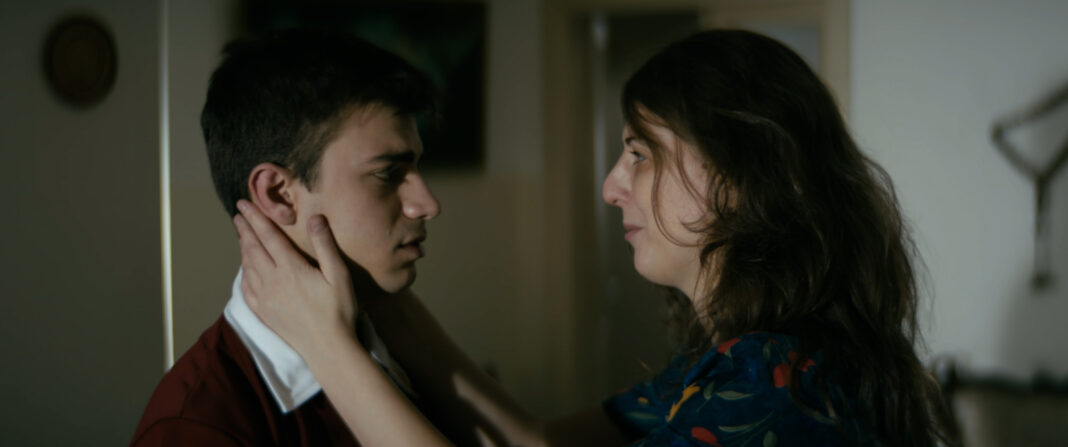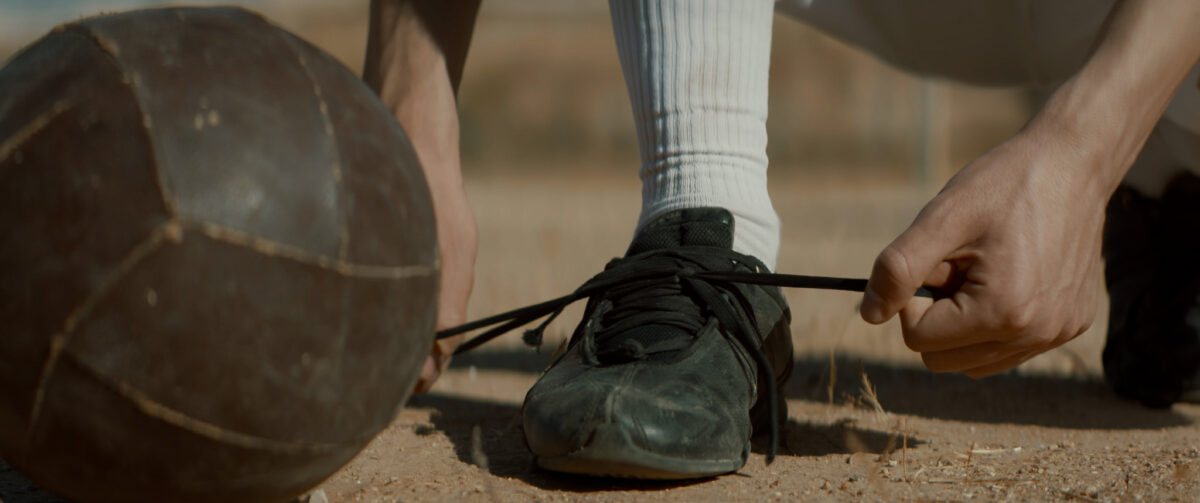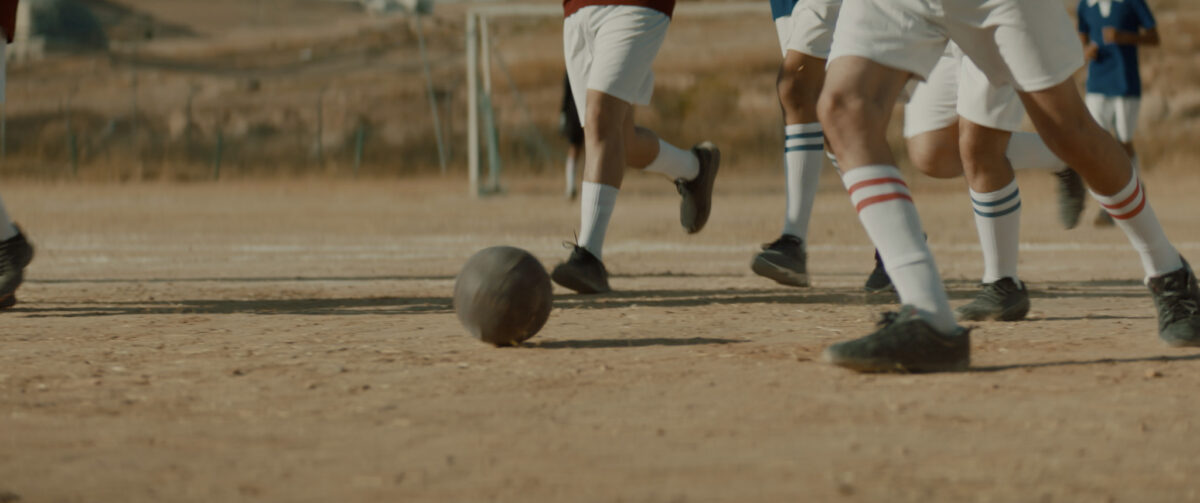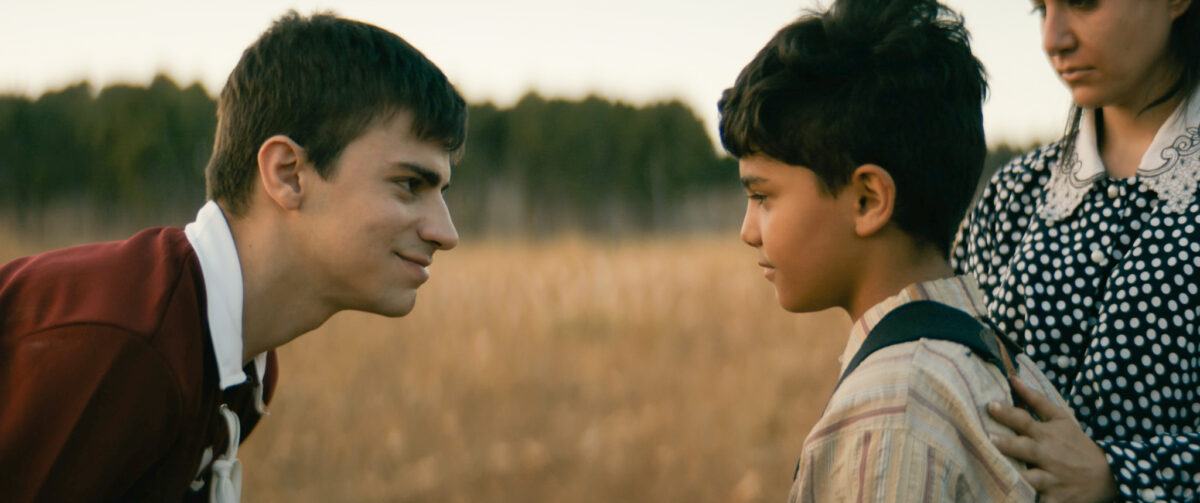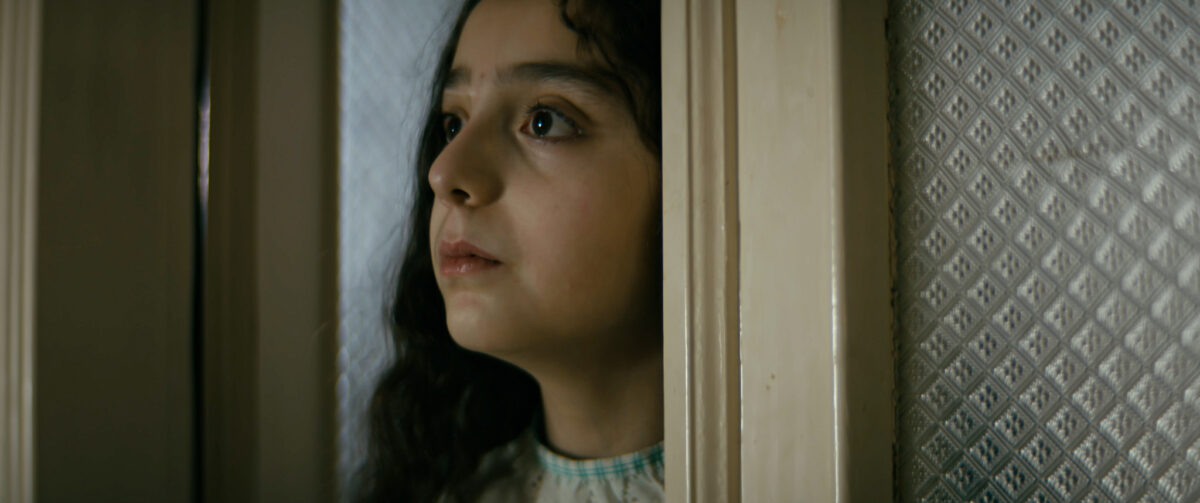Palestine-American film-maker Mohammed Saffouri’s TOUCHLINE takes us back to a key moment in his grandfather’s life when he had ambitions to play football for his national side, but conflict and upheaval stepped in.
Film And TV Now spoke with the film-maker about his work and the themes.
FILM AND TV NOW: This is based on your grandfather’s life at a time when tremendous conflict and change was happening. How close is the film to the real life experience?
MOHAMMED SAFFOURI: The film is so close to the real-life experience, Ahmad’s friends, coach, and even the person who came to scout was the actual head of the Palestinian football committee.
Everything used in this film is factually correct according to my grandfather’s story which my father recorded for my grandfather on a cassette back in 2002. The conversation between my father and my grandfather was the main source for writing the script.
There was also a book which was written by a Palestinian author who moved from Palestine then to Kuwait after the occupation which is what also happened to my grandfather as he went from Palestine to Lebanon and then from Lebanon to Kuwait.
The book was called The Story Of My Life In Palestine and Kuwait by Khairy Abul Jebain. Eliyahu, who plays my grandfather’s friend, was a Palestinian Jew who was mentioned on my grandpa’s recorded cassette. People wondered if I made this up to show that not all Jewish are Zionists.
FTVN: Football has a way of uniting people. Tell us about how football influenced the community back at the time that the story takes place.
MS: Ahmad, my grandfather, is a Muslim Palestinian and his friend, Eliyahu is a Jewish Palestinian, and their coach is a Christian Palestinian, which some people haven’t really noticed in the film, but the coach was wearing a cross necklace.
We were showing that Palestine is a place of diversity, which happened in real-life. People were all playing in the same team, it was rather the Palestinian National or local team. Football was a way to unite people.
FTVN: Tell us about your cast.
MS: The film was shot during Covid in October 2020.
In January 2020 I went to Jordan for pre-production to meet with the main crew members and cast the main characters. However, I ended up casting some of the supporting roles, not the main ones. when I went back to Jordan a couple of weeks before shooting in September 2020, I tried to do some auditions online due to restrictions as I had to quarantine for three weeks in total.
At this point, we had not cast any of the lead roles. Mona Shehabi, our casting director, knew a few people so not everyone was auditioned. Ahmad’s parents were cast via their showreels which I liked so we ended up casting them. We just watched some of their work. My team and I liked them and ended up casting them as Ahmad’s parents.
For the leading role, I was looking for someone who was short, looked like he was in his teenage years, and could play football whilst also having a bit of an acting background. I remember we held auditions and I announced them on my social media accounts. One of my friends reached out to me and gave me Basil Askar’s details, we secured him as the lead three weeks prior to filming.
The actor who was supposed to play Elyahu got Covid three days prior to filming, so we cast Eliyahu three days before filming and there was only time for him to memorize his lines and we would work on them on set before the shoot.
FTVN: Tell us about your production team.
MS: I met the producer and assistant director early on and the cinematographer we secured three weeks prior to shooting. Also, production design and costume design were critical for this film as it’s a period piece, and we didn’t find them until 3 weeks before shooting as well.
FTVN: Where did you shoot and for how long?
MS: We shot our film in Jordan in two cities, we shot in Amman the capital of Jordan and the old city that represents Haifa was shot in Al-Salt.
The only interior scene, which was Ahmad’s house, was filmed in my grandfather’s actual house in Jordan. I thought it was unique and authentic that we shot in his own house, of course, he did not have the house in 1948 when he was a kid, but we had his own house that he lived in later in his life.
The pictures on the wall were of him with his father (real pictures of Ahmed and Hasan), I thought this really connected the actors to the story more. Only three days took us to shoot the short film. but most of the film time was in developing the film and pre-production preparing for the shooting.
FTVN: You graduated from George Mason University. Tell us about that faculty and how important is it to the development of filmmakers like yourself?
MS: I started at George Mason’s doing a computer science major and a few years later, I changed my major in my third year at college to film-making.
I used to see the film students coming out of their classes with all their film equipment, and I was jealous, so I changed my major. The film department really helped me personally with this film, they were really understanding about me travelling to a foreign country to shoot my film, but they were also worried if I couldn’t film it during Covid.
The head of the department, Cynthia Fuchs and my professors were all OK with me missing some of the classes and assignments. I also had Covid in Jordan 2 weeks before shooting, so we had to push filming. The film department at George Masons is great, my film professors are also working film-makers, so they helped me with resources.
I would also like to mention one professor by name, my film and senior advisor Professor Nikyatu Jusu, who is also a Sundance winner for a feature film, she helped me a lot, giving me lots of valuable advice. I am still in contact with George Mason, they gave me the opportunity to work as a TA for Professor Jusu, so I am still learning.
FTVN: You are Palestine-American. Tell us how your mixed culture influences your choices as a film-maker.
MS: This is a really good question, the current film I am working on actually talks about the mix of identity.
As a Palestinian, I never knew what home felt like, I was born and raised in Kuwait and I was a foreigner there, I was not a Kuwaiti, I played on a basketball team, and I was always referred to as the foreigner on the team. They thought I didn’t understand Arabic, and they would talk about me in Arabic in front of me, but I obviously understood every word.
When I would go to Jordan for a visit, even though I have Jordanian citizenship, they would still refer to me as the Kuwaiti or the rich people. However, I was never rich nor Kuwaiti. I never felt at home, yes, I was born in Kuwait, but Kuwait was not home.
When I came to the States, my family lived here when I was younger, I again don’t really feel like the States is my home, English is not my first language, and I am a Muslim American, so I am a minority. I don’t know what home feels like. My parents are back in Kuwait, and they ask when I am coming back home now that college is finished, and my response is always “what home exactly”.
Since living in the States I feel like this is the closest I will come to feel at home. I will keep telling the stories to the people I am living amongst. I am telling my stories and my community’s stories to the American people. Yes, I’m an immigrant, but I’m still an American citizen just like any other American citizen. I’m proud to be a Palestinian-Jordanian American film-maker.
FTVN: What issues and themes are you keen to explore in future work?
MS: I am trying to tell untold stories. I think we have a lot of stories that must be told, and they have not been told yet, due to lack of representation or misrepresentation, we have a lot of stories to tell in real life.
I like telling people’s stories and create films based on true stories. I feel these kinds of stories are more emotional and influential. The issues that I want to explore in future work are the issues that people face in real life.
FTVN: Tell us about the Jordanian Film Industry and what benefits does it bring to both domestic and international filmmakers?
MS: This is a good question; I was surprised by the resources that Jordan has for film-makers.
Film-making in the Middle East is not very recognized. it’s still very new. I was a little apprehensive to film in Jordan because Jordanian Drama is so limited. I was worried about the resources that I would have. However, to my surprise, Jordan has invested a lot of money in film-making and media production in the last 10 years or more.
They have The Royal Film Commission in Jordan which give a lot of grants every year. Personally, we were recipients of a film grant from the Jordan Film Fund. I applied and received $14,000 for my short film. They made our lives easier shooting this film, they gave us the cameras we needed, and permits, and offered police officers to shut down areas.
Jordan is a film hub for a lot of international films. A lot of American films are also shot in Jordan, including Aladdin, Transformers, Star Wars, and Dune to name a few.
FTVN: Who and what are your key cinematic influences?
MS: My surrounding is my main influence. I like to tell stories about people’s experiences that I hear, in my surroundings or that I witness. I think people have a lot of untold stories that are worth telling.
There are a lot of stories that are interesting to be told, we have dramatic stories, and real-time events. What inspired my film Touchline for example was the genocide in Gaza, and many Americans don’t know enough about Palestine, so I wanted to introduce people to the origin of the story. and I couldn’t better story of the Nakba than the story of my grandfather witnessing the Nakba in his own eyes and the story that I heard from him.
FTVN: Would you be interested in expanding this short into a feature idea?
MS: Yes, I am, only if we have the resources and funds., as period pieces cost a lot.
We struggled a lot raising money for this film, it consumed a lot of time and effort as a short so it was hard for me to see it as a feature My professors told me the first draft of TOUCHLINE was far too long and so detailed for a short film, so by that note alone, I have an idea of what this film would look like as a feature.
FTVN: Finally, what are you most proud of about this short film?
MS: That film was my senior thesis that I graduated with from George Mason University, also that it is part of the Tribeca Film Festival, not only that but also it was the first Jordanian film to be selected at Tribeca and the first from GMU.


